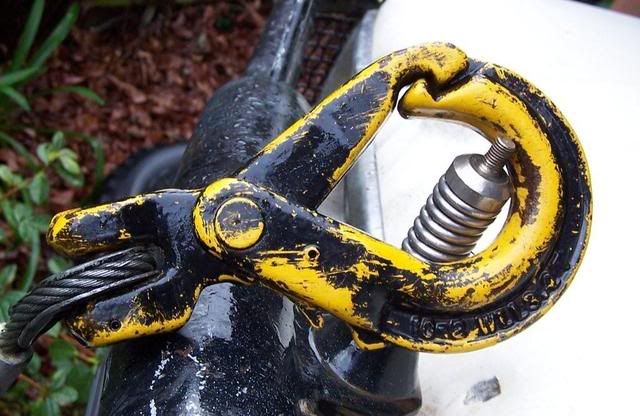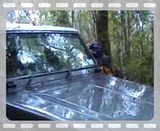Page 2 of 2
Re: steel winch cable
Posted: Thu Sep 04, 2008 4:25 pm
by Sadam_Husain
wjw wrote:I agree with Richard, If I was planning on doing a lot of winching where the cable gets pulled along the ground, ie dragging trees, trucks etc then I would not have gone for synthetic. I will go back to wire if I start doing that.
You try and be smart when your doing that sort of shit regardless of what sort of winch cable you've got and use a snig chain instead of wrecking your flash ARB tree trunk protector or looping the cable around a log and hooking back onto the cable where your going to create a kink in your winch rope. Sometimes you do have to be a bit unkind to your cable but a bit of thinking can usually work out the smart way to do it

Re: steel winch cable
Posted: Thu Sep 04, 2008 4:42 pm
by Bulletproof
Sadam_Husain wrote:wjw wrote:I agree with Richard, If I was planning on doing a lot of winching where the cable gets pulled along the ground, ie dragging trees, trucks etc then I would not have gone for synthetic. I will go back to wire if I start doing that.
You try and be smart when your doing that sort of shit regardless of what sort of winch cable you've got and use a snig chain instead of wrecking your flash ARB tree trunk protector or looping the cable around a log and hooking back onto the cable where your going to create a kink in your winch rope. Sometimes you do have to be a bit unkind to your cable but a bit of thinking can usually work out the smart way to do it

Ditto to the above.
I also use one of these hooks which are big enough to fit both ends of a tree protector and are fool-proof when locked.

Cheers Richard
Re: steel winch cable
Posted: Fri Sep 05, 2008 7:57 am
by wopass
TJ wrote: For synthetic rope you have to use hawse fairlead. Anybody switching from steel to synthetic will have to incorporate that expense as well.
whats wrong with using a roller fairlead with synthetic rope ?
i know a lot of people use HAWSE type fairleads but its not essential, as long as the rollers are in good condition and roll freely then there is less friction on the rope so better for the rope.
Re: steel winch cable
Posted: Fri Sep 05, 2008 8:37 am
by TJ
wopass wrote:whats wrong with using a roller fairlead with synthetic rope ?
i know a lot of people use HAWSE type fairleads but its not essential, as long as the rollers are in good condition and roll freely then there is less friction on the rope so better for the rope.
At an acute angle pull, synthetic rope can get roughed up due to the slight gaps between vertical and horizontal rollers (in the four corners). Under high load that might be enough to cause the line to snap. Its more a safety thing where you are eliminating all possibilities of the rope getting roughed up.
Re: steel winch cable
Posted: Fri Sep 05, 2008 9:00 am
by wopass
TJ wrote:wopass wrote:whats wrong with using a roller fairlead with synthetic rope ?
i know a lot of people use HAWSE type fairleads but its not essential, as long as the rollers are in good condition and roll freely then there is less friction on the rope so better for the rope.
At an acute angle pull, synthetic rope can get roughed up due to the slight gaps between vertical and horizontal rollers (in the four corners). Under high load that might be enough to cause the line to snap. Its more a safety thing where you are eliminating all possibilities of the rope getting roughed up.
so your post should have read.
if you plan on winching at extreme angles then it is recomended to run a hawse farlead.

and running acute angle with load on the rope through a hawse will cause a lot of friction and probably rough the rope as well.
Re: steel winch cable
Posted: Fri Sep 05, 2008 9:15 am
by NJV6
wopass wrote:and running acute angle with load on the rope through a hawse will cause a lot of friction and probably rough the rope as well.
Yip, I'd say more on the hawse as they are generally a tighter radius. We ran rollers on the winch challenge Nissan and had no problems.
Re: steel winch cable
Posted: Fri Sep 05, 2008 9:18 am
by Windsock
Do the over-braid ropes damage the aluminium surface of a hawse fair lead?
Re: steel winch cable
Posted: Wed Jan 14, 2009 7:21 pm
by Mud Hog
Bulletproof wrote:For anyone who is aware or the steep bank down to the Little Totara on the tailings track.
Quite a few people won't drive it and are lowered on a winch. Twice now that I know of the synethic rope has started to smoke and broken because of getting hot from the brake and the ones on the end have unexpectedly dropped to the bottom which is quite dangerous.
Another minus for the synethic rope.
Cheers Richard
Cheers guys was just going out to buy some new synthetic rope but after reading your posts definitly staying with steel cable. Whats the minimum cable I would need for the Bullet proof chasim, The guy I bought the cable off last time would only put 15 m on which is good for nothing. Its just a 8000lb old warn winch can't find any model no. heard it could be the factory one for the Safari. This should hold more than 15 meters should'nt it? This time if he wont put more on ill put it on. Have any of you heard of this before with this winch?
Re: steel winch cable
Posted: Wed Jan 14, 2009 8:12 pm
by wopass
i would say use 9mm rope and you should get 30m of it on ok. but i have never owned or spooled one of them so im only guessing.
Re: steel winch cable
Posted: Wed Feb 04, 2009 11:09 am
by Moriarty
DaveM wrote:At thte start of the clip, is that steam coming off the rope?
Neither.
in the clip, The winching has only just begun. the "steam" is coming off the rope well after it has come away from the drum.
From a nonwinch owners perspective, and looking at it from a vastly different view point, I would say it is water vapour.
]The rope is wet, as per the later posts. as the strain comes on, the water is squeezed out of the fibres at pretty good pressures. It is a cloud of fine water droplets being exuded from down the length of the rope simultaneously, steam would not do that. Steam would come out at the point closest to the heat source .....
comments?
B
Re: steel winch cable
Posted: Wed Feb 11, 2009 8:36 pm
by 85BJ73
Having made and sold wire ropes, I have found the following: 1/Do not go for galvinised, as the layer of galv is included in the overall diameter, and before anyone says it is minimal, consider every strand has a layer on it, so it does add up, and it does make a difference, thats why logging crews use black wire ropes. 2/ 9mm is harder to work with than 8mm, I sold a 9mm wire rope to a friend, he never broke it, but it was hard to wind onto the winch drum, I would stick with 8mm, it is plenty strong enough, talk to the guy's at Shaw's wire ropes, they can advise the best setup.
HTH, Shane
Re: steel winch cable
Posted: Tue Mar 31, 2009 10:59 am
by vvega
Bulletproof wrote:wopass wrote:Bulletproof wrote:For anyone who is aware or the steep bank down to the Little Totara on the tailings track.
Quite a few people won't drive it and are lowered on a winch. Twice now that I know of the synethic rope has started to smoke and broken because of getting hot from the brake and the ones on the end have unexpectedly dropped to the bottom which is quite dangerous.
Another minus for the synethic rope.
Cheers Richard
i would say that is a minus for an electric winch that has a brake in the drum mate. the winch causing rope to smoke is not the ropes downfall.
Im not blaming the rope but the truth is that over 90% of trucks have the brake in the drum. I have the latest Warn 9500 ti and that still has the brake in the drum even though warn have moved 1 planetary gear to the motor end to reduce drum speed and reduce heat.
Here is a clip of one of the two times the synthetic broke which is quite dangerous. Notice the rope smoking under strain.

Cheers Richard
whats the music ?
prolbably my fav bit :d
viva la coutry and western
Re: steel winch cable
Posted: Tue Mar 31, 2009 1:58 pm
by Steve_t647
So in summation
1) If you are doing a lot of winching at high load in bad conditions go for wire (with gloves and recoil protection)
2) If you are using a PTO use either but cover the braid to reduce sun exposure or get it overbraided.
3) If you are using it in competition most now stipulate Synthetic in their rules.
4) If you winch occasionaly, your winch is removable and it is a club truck go for synthetic.
5) if you want less weight replace the 15kg of wire with 3kg of synthetic (30 Meters)
6) If you look after a wire rope or a synthetic rope it will last a long time
Pro's and Con's
Wire Pro's
Long life
Can be used to drag objects to the 4wd
no cleaning or maintanance
Synthetic Pro's
No glove requirement
Light and unspool's easily
lies flat on the ground
Can tie it together and carry on winching
Wire Con's
Fray's you need to wear gloves
coils in loops on the ground trip hazzard
You need to use recoil protection
Can kink
Heavy
cannot be repaired in the field
Synthetic Con's
Some UV issues (less with overbraid)
Cannot drag the rope or an object to you (damage the rope)
can bind on the winch drum
If synthetic is dragged (object pulled to you) it will wear more (more friction to the rope)
Slow to winch down an object with an internal brake due to heat issues
So the answer is both have their places and either will do for most situations but wire will stand up to more abuse for longer than rope, if you clean the synthetic rope and look after it and only winch occasionaly you should be fine

